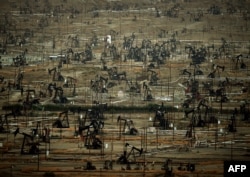World oil prices are likely to remain relatively low over the next year, but a new medium-term market report from the International Energy Agency (IEA) — the world's oil consumer body — predicts a big increase after that, with prices at around $80 a barrel, double what they are now.
The report’s authors say the downturn in prices over the past year-and-a-half led to a downturn in investment, which undermines producers' ability to ramp up production again when demand increases.
Speaking at an annual energy industry conference in Houston, IEA Executive Director Fatih Birol said demand is still weak and supplies remain large, but cutbacks in production are beginning to have an impact.
"Global oil supply growth is plunging and seriously," he said. "At this same period of time in the last six years, it was about 11 million barrels per day and it is now four million barrels per day as a result of low prices."
Market shock
Birol said there have also been cutbacks in investment in new projects, which he said will eventually create a market shock, not simply because demand for oil will increase in coming years, but because of the need to compensate for declining production from existing fields.
"Even if there is zero growth in demand," he said, "every year we have to produce three million barrels a day in order to stay where we are today."
In the oil and gas industry, plans for new fields often take years to develop and implement, and the incentive to invest heavily is undermined by lower prices. The current slump has hit many oil-producing countries hard, especially poorer nations that rely on oil revenues to support social programs.
In the United States, private companies in the energy sector have been cutting back production, investments and jobs. Thousands of workers have been laid off in recent months in Texas, North Dakota, Louisiana, Oklahoma and other oil-rich states.
Economic growth
A slowdown in China's economic growth is one of the reason economists have cited for the drop in world oil prices. China, however, remains focused on meeting its future energy needs.
Birol said China is committed to its energy security and maintains healthy reserve supplies. He said there has also been a noticeable shift of oil trade lines in recent years, with the link between Middle East oil producers and Asia growing stronger.
The IEA director said increasing economic growth in China and elsewhere in the years ahead will boost oil demand, but he said a return to the $100-a-barrel level of mid-2014 is unlikely. He said the spike that he sees to around $80 a barrel will also be temporary, as oil demand will be tempered by increases in energy-use efficiency and the development of renewable energy sources.
U.S. production increase
The IEA's Neil Atkinson, who edited the market report, said he was surprised by both the rapid increase in U.S. production resulting from technological advances applied in shale fields and by the resiliency of the U.S. producers as prices fell.
"Nobody saw, amongst other things, the shale oil phenomenon in the United States coming and we were expecting a very different world,” he said. “We are now in a world where production is growing very strongly. It is having a halt at the moment because of the economics, but that will come back."
Atkinson said that if the United States starts exporting oil, it would likely have little impact on the global market partly because the amount would be relatively small. The United States is still a net importer of oil, so most of its production would stay at home.
The IEA market report shows that the Middle Eastern region remains the largest source of oil for the world market, and the decision by countries in that region to maintain production levels in the past year contributed to the drop in prices.
Russia and Saudi Arabia last week announced a plan to limit production in order to stabilize prices, but Birol said he expected that to have limited impact since the limit set is already higher than what Russia is currently producing. He also noted that the lifting of sanctions on Iran will allow that petroleum-rich Persian Gulf country to export more in the coming months, further bolstering world supply.






